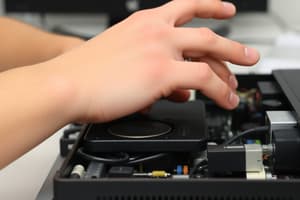Podcast
Questions and Answers
Match the following tools with their functions:
Match the following tools with their functions:
Side-cutting pliers = Cutting wires precisely Needle-nose pliers = Handling small components Flat tweezers = Handling small, flat components like jumpers Serrated tweezers = Removing debris without damaging components
Match the following tools with their descriptions:
Match the following tools with their descriptions:
Pliers = Versatile tools for bending wires and holding tiny components Tweezers = Essential for handling small components and removing debris Crimper = Tool used for crimping cables for secure connections Cable tester = Tool for testing the integrity of network cables
Match the following tools with their main functions:
Match the following tools with their main functions:
Flat tweezers = Handling small, flat components like jumpers Serrated tweezers = Removing debris like dust or glue Side-cutting pliers = Cutting wires without damaging surrounding components Needle-nose pliers = Handling delicate small components and solder joints
Match the following tools with their specific uses:
Match the following tools with their specific uses:
Match the following tools with their primary purpose:
Match the following tools with their primary purpose:
Match the following tools with their descriptions:
Match the following tools with their descriptions:
Match the following crimpers with their uses:
Match the following crimpers with their uses:
Match the following screwdrivers with their features:
Match the following screwdrivers with their features:
Match the following tools with their primary functions:
Match the following tools with their primary functions:
Match the following cable testers with their functions:
Match the following cable testers with their functions:
Study Notes
Essential Computer Hand Tools for Maintenance and Repair
With the ever-growing complexity of computer hardware and electronics, having a well-stocked arsenal of hand tools is vital for anyone looking to perform maintenance, troubleshooting, or repair work on their devices. In this article, we'll explore five indispensable tools that can help you tackle various tasks safely and efficiently.
Pliers
Pliers are versatile tools commonly used to bend or straighten wires, hold tiny components, and even remove stubborn screws. Some common pliers for computer work include:
-
Side-cutting pliers: These pliers, also known as diagonal pliers, can cut wires without damaging surrounding components, ensuring a clean and precise cut.
-
Needle-nose pliers: Delicate enough to handle small components and even solder joints, these pliers have a narrow tip that allows for precise gripping.
Tweezers
Tweezers are essential tools for handling small components and removing debris. They are available in various sizes and tip types, making them a valuable asset for computer repair and maintenance:
-
Flat tweezers: These tweezers are useful for handling small, flat components like jumpers and resistors.
-
Serrated tweezers: These tweezers are effective for removing debris, like dust or glue, without damaging components.
-
Curved tweezers: Curved tweezers are helpful for reaching into tight spaces and removing small components, like ICs, that may be difficult to access with other tools.
Crimper
Crimpers are essential tools used to secure wire ends, making connections more robust and reliable. Some common crimpers for computer work include:
-
Insulation-displacement connectors (IDC) crimpers: IDC crimpers are used to create sturdy connections between wires and printed circuit board (PCB) components.
-
Straight-blade crimpers: Straight-blade crimpers are ideal for creating butt-splice connections, where two wires are crimped together.
Cable tester
A cable tester is a valuable tool used to test the continuity, insulation, and other electrical properties of cables, ensuring proper functioning and safety. Common cable testers for computer work include:
-
Pin-connector cable testers: These testers are used to check the continuity and integrity of connectors like USB or Ethernet.
-
Multimeter cable testers: Multimeter cable testers can be used to measure voltage, current, resistance, and other electrical properties of cables.
Screwdriver
Screwdrivers are essential tools used for loosening or tightening screws in computer hardware. Some common screwdrivers for computer work include:
-
Precision-tip screwdrivers: These screwdrivers are designed for use in tight spaces and typically have a magnetic tip to prevent loss of screws.
-
Phillips and Pozidriv screwdrivers: These screwdrivers are commonly used for screws found in computer hardware.
-
Slotted screwdrivers: These screwdrivers are used for screws that have a flat head and are typically used in older computer systems.
While these tools are focused on computer maintenance and repair, they can also be useful in other electronics work. Understanding the proper use and applications of these tools is essential for safe and effective computer repair. By acquiring these tools and learning proper techniques, you'll be able to handle various computer problems and keep your devices running smoothly and safely.
Studying That Suits You
Use AI to generate personalized quizzes and flashcards to suit your learning preferences.
Description
Test your knowledge of essential hand tools used for computer maintenance and repair, from pliers to tweezers to cable testers. Learn the importance of each tool and how they are used in handling various computer tasks effectively.




